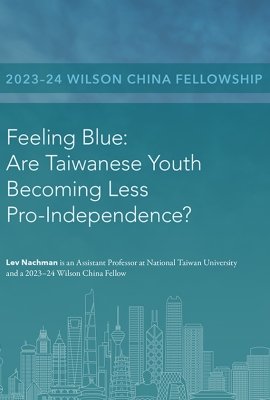Lev Nachman
Wilson China Fellow
Professional Affiliation
Assistant Professor, National Chengchi University
Expert Bio
Lev Nachman is an Assistant Professor in the College of Social Science at National Chengchi University in Taiwan. He was previously the Hou Family Postdoctoral Research Fellow in Taiwan Studies at the Harvard Fairbank Center and holds his Ph.D. in political science from the University of California, Irvine. His research focuses on political participation and social protest in Taiwan, Cross-Strait relations, and U.S.-Taiwan relations.
Dr. Nachman regularly provides commentary on Taiwanese and Cross-Strait politics and U.S.-Taiwan relations. He is frequently quoted in the New York Times, CNN, Bloomberg, the BBC, and the Guardian. He publishes widely in outlets including Foreign Policy, the Diplomat, and peer-reviewed journals including Political Research Quarterly and Asian Survey. He is based in Taipei and speaks fluent Mandarin. Dr. Nachman is a Nonresident Fellow at the Atlantic Council and the National Bureau of Asian Research.
Expertise
- Politics of Taiwan
- Political participation and social protest in Taiwan
- Cross-Strait relations
- US-Taiwan relations
Wilson Center Project
Feeling Blue: Are Taiwanese Youth Becoming Less Pro-Independence?
Project Summary
Why have Taiwanese youth become more attracted to the pan-Blue-leaning Taiwan People’s Party instead of the pan-Green-leaning Democratic Progressive Party? Why do so many young voters prefer center-Blue politicians like Ko Wen-je instead of Green politicians like William Lai? Are Taiwanese youth less pro-independence today than they used to be? To account for changes in Taiwanese youth voting behavior, I plan to conduct a multi-method project around Taiwan that will combine qualitative discussion group and interview data along with original survey data to hear from and understand young Taiwanese voters. Understanding how the youngest cohorts of voters in Taiwan feels about politics, identity, China, the US, and their own aspirations will become a paramount question for both the academic and policy communities in the coming years.
Insight & Analysis by Lev Nachman
- Publication
- Elections
Feeling Blue: Are Taiwanese Youth Becoming Less Pro-Independence?

- Publication
Analyzing China's Domestic and Foreign Policies

- Past event
Wilson China Fellowship Conference 2024


